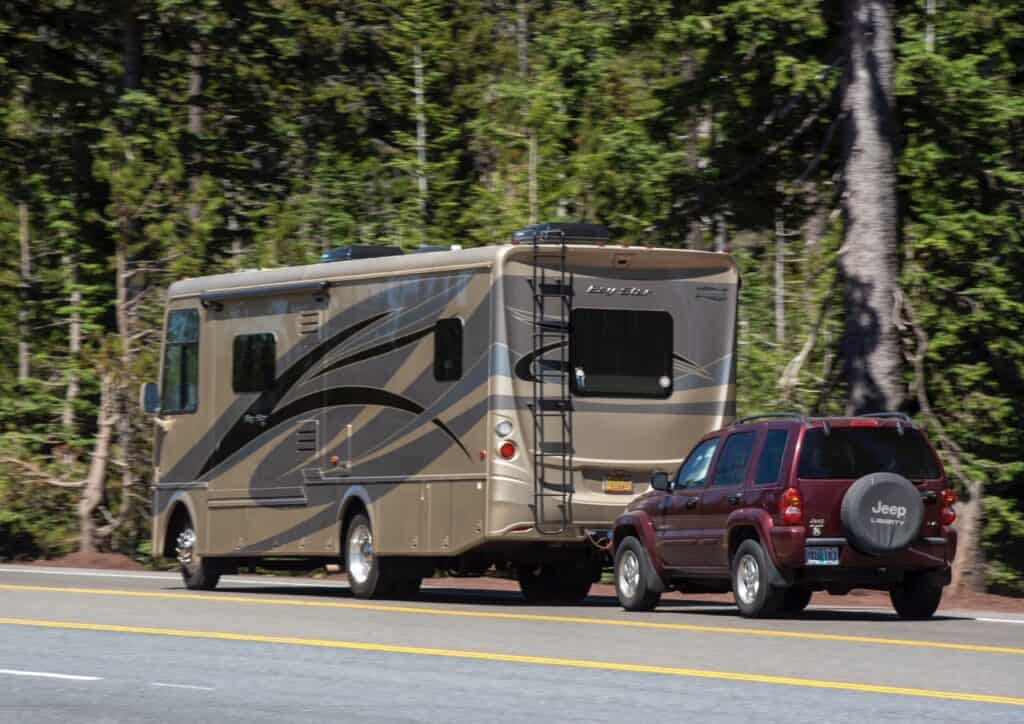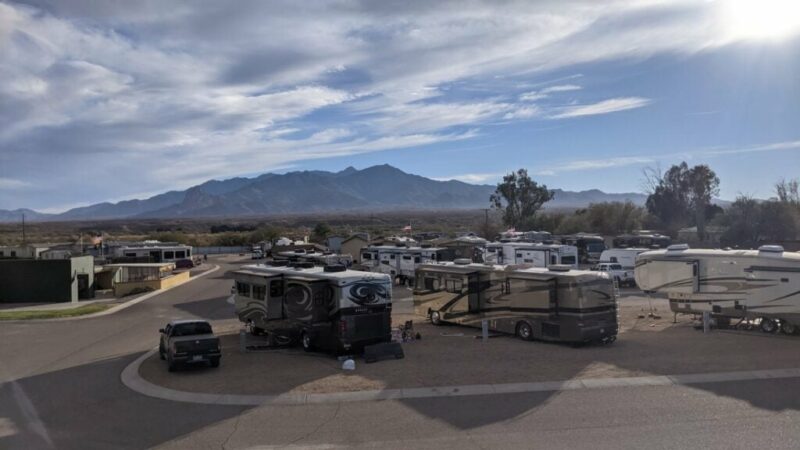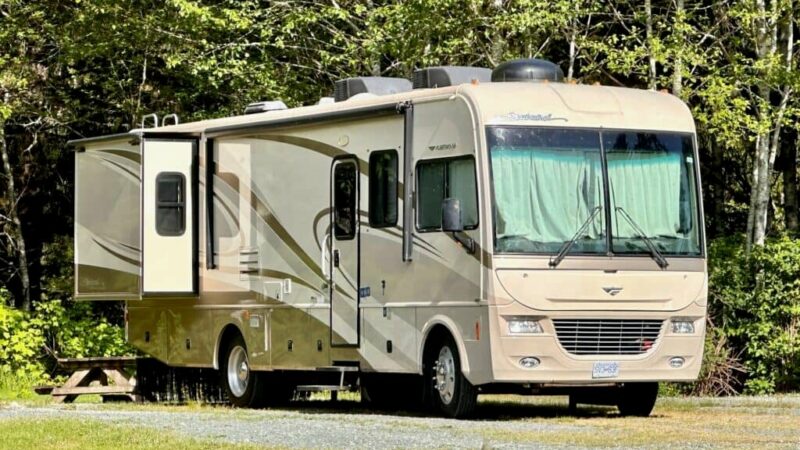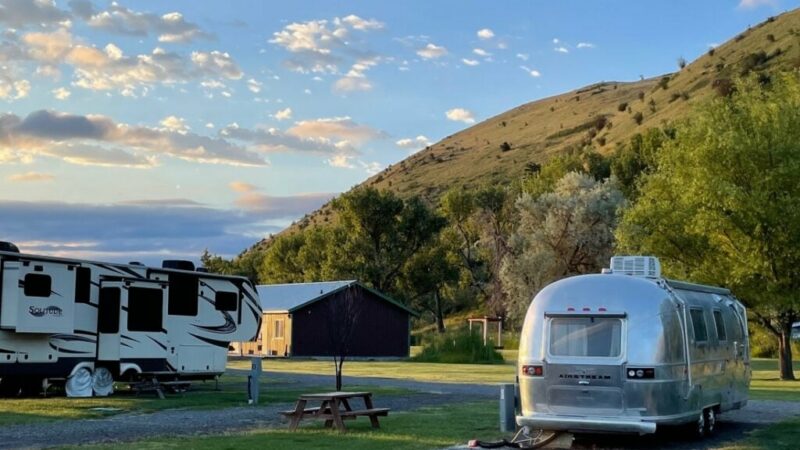Gas Or Diesel Motorhome? Which Is Right For You?
Motorhome buyers often ask, “Which is better for me: A gas or diesel Class A motorhome?” There is no right answer, other than “It depends.”
In fact, it depends on multiple factors:
- What is your budget?
- How often will you be using the coach?
- Full-time or part-time?
- Will you be towing a dinghy or trailer?
- Are your outings going to include driving in the mountains?
- Do you need the latest in technology?
- Is luxury a priority?
- How important is ride and handling?
Here are a few more considerations that should help you decide if a gas or diesel motorhome is for you.
Price
Diesel motorhomes have a higher price point than a gas-powered model of similar size. It’s not unusual for an entry-level diesel Class A motorhome to cost $50,000–$150,000 more than a luxury gas-powered Class A motorhome of similar size and floorplan.
Diesel motorhomes are generally better appointed with more standard features than a gas version. For example a 2024 Newmar Kountry Star diesel pusher costs $142,000 more than a gas-powered 2024 Newmar Bay Star (MSRP $237,720). There’s also a $125,276 difference in base price between the diesel Winnebago Inspire ($379,419) and gas Adventurer ($254,143).
Class A Gas Price Range
- Entry Level: $115,000-$145,000
- Mid-Level: $145,000-$185,000
- Luxury-Level: $195,000-$250,000
Class A Diesel Price Range
- Entry Level: $195,000-$300,000
- Mid-Level: $325,000-$450,000
- Luxury Level: $450,000-$2,500,000+
Depreciation on a Gas or Diesel Motorhome
A very important aspect to consider when of buying a gas or diesel motorhome is depreciation. The moment the wheels of a new RV hit the pavement, the typical value drops by about 20 percent. That’s according to data collected by J.D. Power, RV BlueBooks, and similar vehicle research centers.
By the time an RV is four years old, the depreciation is around 30 percent. A five-year-old gas or diesel motorhome will have lost about 40 percent of its original purchase price. After that, the drop in value flattens out over the next 6–10 years.
These values are based more on how old the RV is rather than how many miles it’s accrued. That’s because most motorhomes “die” due to failures of the body rather than the drivetrain.
The best advice is to shop around for models that are four to six years old with low mileage. Used motorhomes in this segment are usually very well maintained and offer a good value for the dollar.
Ride Quality on a Gas or Diesel Motorhome
Ride and handling play a big role if you are buying a gas or diesel motorhome. Nothing is more annoying than a rough ride. Today’s gas-powered motorhomes are usually built on the Ford F-53 chassis, which comes with the 7.3-liter V-8 and a six-speed automatic. It’s a basic leaf-spring chassis built exclusively for motorhomes. The ride and handling is dependent on what upgrades the RV manufacturer has done to mitigate the issues that leaf springs tend to exhibit in this application.
Diesel-pushers, on the other hand, are built on completely different chassis by a handful of manufacturers, notably Freightliner and Spartan. Air suspensions, independent front suspensions, steering assist, a more robust frame, passive steering tag axles, air braking systems and larger fuel tanks are just a few of the features found in many of today’s diesel-powered motorhomes.
These diesel chassis deliver far better ride and handling than found under a typical gas-powered motorhome. Pushers, because of the engine location, are also quieter on the road and diesels can have twice the owing capacity than that of a gasoline-powered motorhome.
If extended travel, cross-country touring, or full-time RVing is the plan for buying a motorhome, then focusing on a diesel-pusher, even an entry-level model, is highly recommended.
Likewise, if you are planning on towing a dinghy (car, SUV, pickup, toy trailer) cross-country, or in the mountains, a diesel-powered motorhome is the best choice because they can have double the towing capacity of a gas counterpart.
Fuel Economy on a Gas or Diesel Motorhome
According to the Department of Energy, diesel motorhomes get about 15 pecent better fuel economy than a comparable gas-powered motorhome. That’s because diesel has about a 15 percent greater thermal energy per gallon than gasoline. Most experts say gas-powered motorhomes get between 6–10 mpg while a diesel coach of similar size gets 8-14 mpg.
Diesel fuel is more expensive than gas, with the current national average, according to the February 2024 fuel update from the U.S. Energy Information Administration (EIA), is Regular gasoline cost $3.14 per gallon while on-highway diesel was $3.97 per gallon.
Longevity on a Gas or Diesel Motorhome
The life expectancy of a motorhome is more dependent on the build quality and maintenance of the “box” on top of the chassis than it is of the engine and transmission. A well-maintained gas or diesel motorhome stored out of the weather can have a good service life of around 20 years.
As for miles on the unit, a gas-powered motorhome engine and transmission that have been serviced according to the manufacturers’ recommendations should have a life between 150,000–200,000 miles. A diesel that’s had the same care will typically have a lifespan between 300,000–500,000 miles.
The reason motorhome diesel engines last as much as three-times as long as a comparable gasoline engine is because they are built more stoutly. Plus, diesel fuel is less acidic than gasoline, which helps reduce wear. The longer life expectancy of diesel motorhomes is just one reason they have a higher resale value than those powered by gasoline.
Engine Maintenance Time & Miles
Maintenance is a critical factor in the life expectancy and value of any gas or diesel motorhome. Service of both engine types depends on multiple factors. But it is all essentially based on time (months) and miles.
For example, in the 2022 Newmar Super Star and Ventana diesel pusher owner’s manuals say to change engine oil every three months or 7,500 miles, whichever comes first. At least once a year replace the fuel filter and fuel/water separator, and every four years replace both the engine coolant and transmission fluid and filter.
Meanwhile, Cummins’ Quick Reference Guide for motorhomes says every six months or 15,000 miles for the ISB5.9 and ISB6.7s built before 2021. The 2021-newer ISB6.7L is 18 months or every 20,000 miles. The Cummins X15 oil and filter change is at 12 months or 20,000 miles for 2021-newer models and every six months or 20,000 miles for those built prior to 2017.
Ford’s big Godzilla gas V-8 has a service interval of 10,000 miles, whereas the old V-10 oil/filter service was at 7,000-mile intervals. That’s why it’s important to read the motorhome’s owner’s manual for the engine, then determine which service interval is best suited for your type of use.
Cost of Ownership
Gas or diesel motorhomes, like all vehicles, have a built-in cost-of-ownership factor. The more you drive it, the more it costs for maintenance. It’s not unusual for a motorhome owner to spend between $1,000–$2,000 a year for basic engine services.
A basic diesel engine service is considerably more expensive than that of the Ford 7.3-liter V-8. That’s because diesels have fuel and water separator filters, that by themselves, cost upwards of $500. That’s not even counting the cost of engine oil itself. And diesels require a lot of oil. While Ford’s V-8 takes about two gallons, a pusher with a Cummins 6.7-liter requires 12 quarts. One running a Cummins X15 needs 44 quarts (11 gallons). Oil costs add up over the years!
The good news is today’s motorhome diesel engines like the Cummins don’t need an oil and filter change as often as a gas engine. The newest Cummins, for example, have a service interval of 20,000-miles or once a year. The newest Ford gasoline engines used in motorhomes have a recommended service every 10,000 miles. (Older V-10 gas models require oil/filter changes around 7,000 miles.)
Whether you choose a gas or diesel motorhome, and how happy you are with that choice, depends a lot on how diligent you are on keeping it serviced and maintained inside and out.
The Verdict
So, which is better for you? A gas or diesel Class A motorhome? Are the benefits of a diesel-pusher worth the extra time, effort, and money? Or, are the variety, cost, and familiarity of a gasser more your style? Since you’ll be living in it, and it’s your checkbook, that’s for you to decide.
The post Gas Or Diesel Motorhome? Which Is Right For You? appeared first on RV LIFE.






